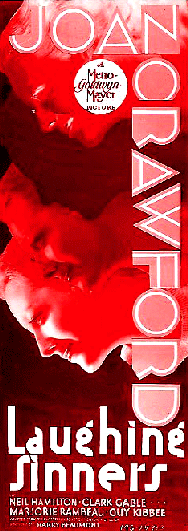Laughing Sinners
| Laughing Sinners | |
|---|---|
 Original film poster | |
| Directed by | Harry Beaumont |
| Written by | Continuity: Bess Meredyth Dialogue: Martin Flavin Edith Fitzgerald |
| Based on | Torch Song 1930 play by Kenyon Nicholson |
| Starring | Joan Crawford Neil Hamilton Clark Gable |
| Cinematography | Charles Rosher |
| Edited by | George Hively |
| Music by | Charles H. Gabriel Martin Broones Ina D. Ogden |
| Distributed by | Metro-Goldwyn-Mayer |
Release date |
|
Running time | 72 minutes |
| Country | United States |
| Language | English |
| Budget | $338,000[1] |
| Box office | $765,000[1] |
Laughing Sinners is a 1931 American pre-Code Metro-Goldwyn-Mayer feature film starring Joan Crawford and Clark Gable in a story about a cafe entertainer who experiences spiritual redemption. The dialogue by Martin Flavin was based upon the play Torch Song by Kenyon Nicholson. The film was directed by Harry Beaumont. Laughing Sinners was the second of eight cinematic collaborations between Crawford and Gable.
Plot[]
Ivy Stevens (Joan Crawford) is a cafe entertainer in love with a shifty salesman (Neil Hamilton) who deserts her. In attempting to commit suicide, she is saved by Carl (Clark Gable), a Salvation Army officer. Encouraged by Carl, Ivy joins the Salvation Army. When her old flame re-enters her life, Ivy finds she is still attracted and begins another affair with him. Carl steps in and urges Ivy to resume her life with the Salvation Army. Ivy realizes that if she continues the affair, her life will only spiral downward. She drops the affair and resumes her commitment to the Salvation Army.
Cast[]
- Joan Crawford as Ivy Stevens
- Neil Hamilton as Howard Palmer
- Clark Gable as Carl Loomis
- Marjorie Rambeau as Ruby
- Guy Kibbee as Cass Wheeler
- Cliff Edwards as Mike
- Roscoe Karns as Fred Geer
- Gertrude Short as Edna
- George Cooper as Joe
- George F. Marion as Humpty
- Bert Woodruff as Tink
Production[]
Casting[]
John Mack Brown was originally playing Gable's role when the studio decided to scrap his footage and reshoot the part with Gable taking Brown's place. At that point, Brown's distinguished career in mainstream feature films ended forever and he wound up demoted to cowboy B pictures, with his name changed to "Johnny Mack Brown."
Crawford and Rambeau, who both play chorus girls in Laughing Sinners, would go on to play mother (Rambeau) and daughter (Crawford) in the film Torch Song in 1953. "Torch Song" is the name of the play on which Laughing Sinners is based.
Reception[]
Critical reception[]
Andre Sennwald commented in The New York Times, "Miss Crawford...has tempered the intense and not a little self-conscious quality of her acting without hurting her vibrant and breath-catching spirit."[2]
Box office[]
According to MGM records the film earned $624,000 in the US and Canada and $141,000 elsewhere, resulting in a profit of $156,000.[1]
See also[]
References[]
External links[]
- 1931 films
- English-language films
- 1931 drama films
- American films
- American black-and-white films
- American drama films
- American films based on plays
- Films directed by Harry Beaumont
- Metro-Goldwyn-Mayer films
- The Salvation Army